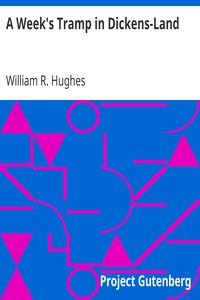Read this ebook for free! No credit card needed, absolutely nothing to pay.
Words: 61585 in 21 pages
This is an ebook sharing website. You can read the uploaded ebooks for free here. No credit cards needed, nothing to pay. If you want to own a digital copy of the ebook, or want to read offline with your favorite ebook-reader, then you can choose to buy and download the ebook.


: A Week's Tramp in Dickens-Land Together with Personal Reminiscences of the 'Inimitable Boz' Therein Collected by Hughes William R William Richard Kitton Frederic George Illustrator - Dickens Charles 1812-1870; England Description and travel
This was written soon after our first visit to Strood at the end of August, 1888. Within little more than two years afterwards, on Thursday, 7th August, 1890, I had the mournful pleasure of being present at the funeral of my friend, which took place at Frindsbury Church on that day, in the presence of the sorrowing relatives and of a large concourse of admirers, both local and from a distance. There were also present many representatives of distinguished scientific societies, including Dr. John Evans, F.R.S., Treasurer of the Royal Society, and President of the Society of Antiquaries.
He was elected a Fellow of the Society of Antiquaries so far back as 1836, and at the time of his death was an Honorary Member or Fellow of at least thirty learned societies of a kindred nature in Great Britain and on the continent, and had been honoured by his colleagues and admirers in having his medal struck on two occasions.
A most distinguished antiquarian, a thoroughly honourable man, a versatile and accomplished gentleman, and a kind-hearted and liberal friend, the town of Strood, to which he was for so many years endeared, will long and deservedly mourn his loss.
Miss Hogarth informs me that her brother-in-law frequently dined out in the neighbourhood, accompanied by his daughter and herself.
CHATHAM:--ST. MARY'S CHURCH, ORDNANCE TERRACE, THE HOUSE ON THE BROOK, THE MITRE HOTEL, AND FORT PITT. LANDPORT:--PORTSEA, HANTS.
THE naval and military town of Chatham, unlike the Cathedral city of Rochester, has, at first sight, few attractions for the lover of Dickens. Mr. Phillips Bevan calls it "a dirty, unpleasant town devoted to the interests of soldiers, sailors, and marines." We are not disposed to agree entirely with him; but we must admit that it has little of the picturesque to recommend it--no venerable Castle or Cathedral to attract attention, no scenes in the novels of much importance to visit, no characters therein of much interest to identify. Mr. Pickwick's own description of the four towns of Strood, Rochester, Chatham, and Brompton, certainly applies more nearly to Chatham than to the others; but things have improved in many ways since the days of that veracious chronicler, as we are glad to testify:--
"The principal productions of these towns," says Mr. Pickwick, "appear to be soldiers, sailors, Jews, chalk, shrimps, officers, and dockyard men. The commodities chiefly exposed for sale in the public streets are marine stores, hard-bake, apples, flat-fish, and oysters. The streets present a lively and animated appearance, occasioned chiefly by the conviviality of the military. . . .
"The consumption of tobacco in these towns," continues Mr. Pickwick, "must be very great; and the smell which pervades the streets must be exceedingly delicious to those who are extremely fond of smoking. A superficial traveller might object to the dirt, which is their leading characteristic; but to those who view it as an indication of traffic and commercial prosperity, it is truly gratifying."
And yet for all this, there are circumstances to be noticed of the deepest possible interest connected with Chatham, and spots therein to be visited, which every pilgrim to "Dickens-Land" must recognize. At Chatham,--"my boyhood's home," as he affectionately calls it,--many of the earlier years of Charles Dickens were passed; here it was "that the most durable of his earlier impressions were received; and the associations around him when he died were those which at the outset of his life had affected him most strongly."
The church, now undergoing reconstruction, is not a very presentable structure, and has little of interest to recommend it, except a brass to a famous navigator named Stephen Borough, the discoverer of the northern passage to Russia , and a monument to Sir John Cox, who was killed in an action with the Dutch . The name of Weller occurs on a gravestone near the church door.
We cross the High Street, proceed along Railway Street, formerly Rome Lane, pass the Chatham Railway Station , and find ourselves at Ordnance Terrace, a conspicuous row of two-storied houses, prominently situated on the higher ground facing us, beyond the Station. In one of these houses the Dickens family resided from 1817 to 1821. The present occupier is a Mr. Roberts, who kindly allows us to inspect the interior. It has the dining-room on the left-hand side of the entrance and the drawing-room on the first floor, and is altogether a pleasantly-situated, comfortable, and respectable dwelling. No. 11, "the second house in the terrace," is overgrown with a Virginia creeper, which, from its possible association with Dickens's earliest years, may have induced him to plant the now magnificent one which exists at Gad's Hill. "Here it was," says Forster, "that his first desire for knowledge, and his greatest passion for reading, were awakened by his mother, who taught him the first rudiments, not only of English, but also, a little later, of Latin. She taught him regularly every day for a long time, and taught him, he was convinced, thoroughly well." Mr. Langton also says that "It was during his residence here that some of the happiest hours of the childhood of little Charles were passed, as his father was in a fairly good position in the Navy Pay Office, and they were a most genial, lovable family." Here it was that the theatrical entertainments and the genial parties took place, when, in addition to his brothers and sisters and his cousin, James Lamert, there were also present his friends and neighbours, George Stroughill, and Master and Miss Tribe.
About the year 1821 pecuniary embarrassments beset and tormented the Dickens family, which were afterwards to be "ascribed in fiction" in the histories of the Micawbers and the Dorrits, and the family removed to the House on the Brook. In order to follow their steps in perfect sequence, we have to return by the way we came from the church, cross the High Street, and proceed along Military Road, so as to visit the obscure dwelling, No. 18, St. Mary's Place, situated in the valley through which a brook, now covered over, flows from the higher lands adjacent, into the Medway.
Free books android app tbrJar TBR JAR Read Free books online gutenberg
More posts by @FreeBooks

: The Inhabited by Wilson Richard Ashman William Illustrator - Science fiction; Short stories; Human-alien encounters Fiction







